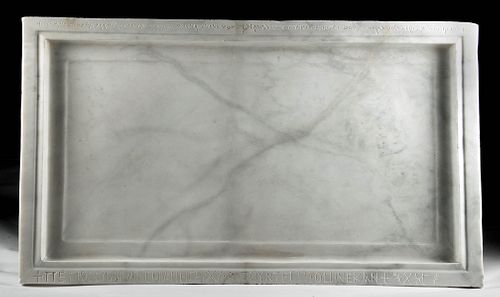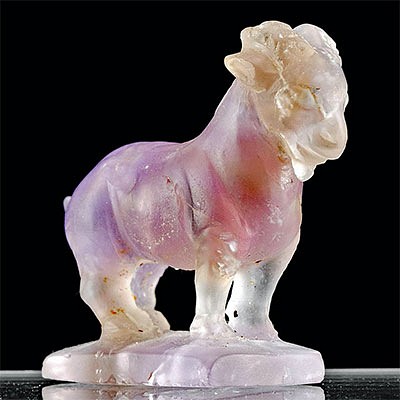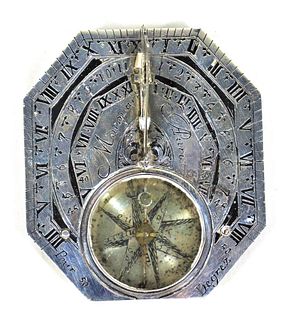An Important Translated Byzantine Marble Altar Tabletop
Lot 45
About Seller
Artemis Fine Arts
686 S Taylor Ave, Ste 106
Louisville, CO 80027
United States
Selling antiquities, ancient and ethnographic art online since 1993, Artemis Gallery specializes in Classical Antiquities (Egyptian, Greek, Roman, Near Eastern), Asian, Pre-Columbian, African / Tribal / Oceanographic art. Our extensive inventory includes pottery, stone, metal, wood, glass and textil...Read more
Categories
Estimate:
$20,000 - $30,000
Absentee vs Live bid
Two ways to bid:
- Leave a max absentee bid and the platform will bid on your behalf up to your maximum bid during the live auction.
- Bid live during the auction and your bids will be submitted real-time to the auctioneer.
Bid Increments
| Price | Bid Increment |
|---|---|
| $0 | $25 |
| $300 | $50 |
| $1,000 | $100 |
| $2,000 | $250 |
| $5,000 | $500 |
| $10,000 | $1,000 |
| $20,000 | $2,500 |
| $50,000 | $5,000 |
| $100,000 | $10,000 |
| $200,000 | $20,000 |
About Auction
By Artemis Fine Arts
Dec 2, 2021
Set Reminder
2021-12-02 10:00:00
2021-12-02 10:00:00
America/New_York
Bidsquare
Bidsquare : Fine Antiquities | Asian | Ethnographic Art
https://www.bidsquare.com/auctions/artemis-gallery/fine-antiquities-asian-ethnographic-art-7918
Features classical antiquities, ancient and ethnographic art from cultures encompassing the globe. Egyptian, Greek, Roman, Etruscan, Near Eastern, Asian, Pre-Columbian, Native American, African / Tribal, Oceanic, Spanish Colonial, Russian, Fine / Visual Arts, so much more! Artemis Fine Arts info@artemisfinearts.com
Features classical antiquities, ancient and ethnographic art from cultures encompassing the globe. Egyptian, Greek, Roman, Etruscan, Near Eastern, Asian, Pre-Columbian, Native American, African / Tribal, Oceanic, Spanish Colonial, Russian, Fine / Visual Arts, so much more! Artemis Fine Arts info@artemisfinearts.com
- Lot Description
**This is an oversized piece that may require special shipping. Please inquire for a quote prior to bidding.
Holy Land, Late Roman / Early Byzantine Period, ca. mid-5th to 6th century CE. A marvelous marble altar tabletop of an immense scale and a rectangular form. The elegant piece displays a recessed central basin and a raised rim inscribed with Ancient Greek text along one long side and Syriac Aramaic on the other, each flanked by a pair of Greek crosses and written with the periphery serving as the bottom so that a sitter at the table would be able to read the inscription in front of them. The Ancient Greek text reveals that this was an altar table, translating to "Petros with his wife Kosmiane presented [this] as offering with gratitude" and is followed by 2 palm leaves and 3 letters - X, M, and the Greek letter gamma - which serve as a Christogram meaning "Mary is the mother of Christ." The Aramaic Syriac script likely bears a plea to God in return for the offering of the table. Size: 55" L x 31.7" W x 2.1" H (139.7 cm x 80.5 cm x 5.3 cm)
Though minimalist in form, the table boasts a skillfully carved 3-tier border, with the highest tier bearing the inscription and the lowest only slightly elevated from the central basin. An additional inscription of a symbol that combines the letters T, P, O, and Y is featured on the verso, likely intended to represent either the artist's signature, the church for which the table was intended, or the city in which the table was located.
Marble tabletops have been found widely throughout the Roman and Byzantine Empires; however, the vast majority exist as only small fragments. These tabletops were used to celebrate feasts for the dead at grave sites - a commemorative practice known throughout the Roman and early Byzantine worlds - and were often supported by bases and elaborately incised with messages promising salvation.
Prior to the 2nd century, Romans cremated their dead; around that time, inspired by the Greek and Etruscan practice of using sarcophagi, they began to place their dead in sarcophagi. This trend spread rapidly throughout the Roman Empire. In the western part of the Empire, sarcophagi were placed inside a mausoleum against a wall or in a niche, so the only decorated panels were on the front and the short sides. This tabletop probably came from the grave of a high-status Roman citizen.
A marble tabletop with an identical Greek inscription is discussed in "Syria Grammata Kai Agalmata" by Hassan Salame-Sarkis in the journal Syria, 66, no. 1/4 (Institut Francais du Proche-Orient, 1989), 320-322.
This piece has been searched against the Art Loss Register database and has been cleared. The Art Loss Register maintains the world's largest database of stolen art, collectibles, and antiques.
Provenance: private West Hollywood, California, USA collection; ex-Westreich collection, Rancho Santa Fe, California, USA and previously on display in Chevy Chase, Maryland, USA, acquired on the London art market and imported into the US in 1985
All items legal to buy/sell under U.S. Statute covering cultural patrimony Code 2600, CHAPTER 14, and are guaranteed to be as described or your money back.
A Certificate of Authenticity will accompany all winning bids.
PLEASE NOTE: Due to recent increases of shipments being seized by Australian & German customs (even for items with pre-UNESCO provenance), we will no longer ship most antiquities and ancient Chinese art to Australia & Germany. For categories of items that are acceptable to ship to Australia or Germany, please contact us directly or work with your local customs brokerage most antiquities and ancient Chinese art to Australia & Germany. For categories of items that are acceptable to ship to Australia or Germany, please contact us directly or work with your local customs brokerage replace this
#166697Repaired from several pieces with some very light restoration and most break lines visible. Chipping with small areas of loss to peripheries. Otherwise, excellent with smooth surfaces and impressive remaining detail to inscriptions.Condition
- Shipping Info
-
All shipping is handled in-house for your convenience. Your invoice from Artemis Gallery will include shipping calculation instructions. If in doubt, please inquire BEFORE bidding for estimated shipping costs for individual items.
-
- Buyer's Premium



 EUR
EUR CAD
CAD AUD
AUD GBP
GBP MXN
MXN HKD
HKD CNY
CNY MYR
MYR SEK
SEK SGD
SGD CHF
CHF THB
THB



















